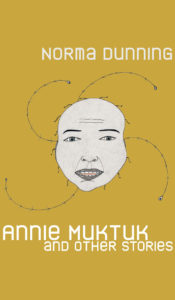August 2, 2017
Annie Muktuk and Other Stories, by Norma Dunning
 When I read the article, “What inspired her was getting mad,” about the story behind Norma Dunning’s debut collection, Annie Mukluk and Other Stories, I was not surprised. Acts of justice and revenge factor throughout the book, propelling the stories so terrifically. Dunning wrote her stories in response to ethnographic representations of Inuit people that neglected to show them as actual people, and the result is a book that’s really extraordinary. Because her people are so real, people who laugh, and joke, and drink, and have sex (and they have a lot of sex). Her characters love each other fiercely, family ties are nurtured in spite of obstacles (including residential schools and their legacy) and they all have a great deal of fun playing with the ignorance of the qallunaaq (Anglo-Canadian) and their perceptions of the north.
When I read the article, “What inspired her was getting mad,” about the story behind Norma Dunning’s debut collection, Annie Mukluk and Other Stories, I was not surprised. Acts of justice and revenge factor throughout the book, propelling the stories so terrifically. Dunning wrote her stories in response to ethnographic representations of Inuit people that neglected to show them as actual people, and the result is a book that’s really extraordinary. Because her people are so real, people who laugh, and joke, and drink, and have sex (and they have a lot of sex). Her characters love each other fiercely, family ties are nurtured in spite of obstacles (including residential schools and their legacy) and they all have a great deal of fun playing with the ignorance of the qallunaaq (Anglo-Canadian) and their perceptions of the north.
In “The Road Show Eskimo,” an elderly Inuit woman who found fame as the apparent author of a book about her experiences in the South—except the book was a fraud and it had been written by her white ex-husband—makes money from this endeavour and she even relishes the role she has to play to conform to peoples’ expectations. But on the particular day depicted in this story, the woman is going to take back her identity and use the power she’s been holding all along.
Such power also factors in the story “Husky,” about a HBC Agent who brings his three Inuit wives to Winnipeg where they are all made victims of violent racism—until they aren’t anymore, and the women take matters into their hands in the most fantastic feat of justice.
I loved “Elipsee,” about a man who’s taking his beloved wife out on the land one more time—she’s dying of cancer and this is the one thing left to try, and it actually works, in a beautiful, sad and perfect way, as the couple reconnects with their own history and that of their ancestors. In “Kakoot,” an Inuit man at the end of his life tries to leave this world for the next, which is complicated when you life in an old age home in the south and the spirit of your land and people are hard to come by.
And “Annie Muktuk” is the gorgeous story of two friends, one of whom has fallen in love with the titular character, described as follows:
“What I couldn’t get into Moses Henry’s head was that she just wasn’t Annie Mukluk. She was bipolar. She liked the Arctic and the Antarctic. She played with penguins and the polar bears. Annie Mukluk liked to fuck and she did it with everyone in Igloolik and everywhere else she went. She’d fuck your father, your sister, all your brothers and finish off with your mother. She swung both ways and sideways.”
(This paragraph joins the one about Slutty Marie from Megan Gail Coles’ Eating Habits… as perhaps two of my favourite paragraphs about women with voracious sexual appetites in all of Canadian literature.)
Anyway, the two friends, Moses Henry and Johnny Cochrane are each puzzling out the ways forward in their lives, in a fantastic, ferocious and bawdy novella about love, and brotherhood and friendship. I loved it. In “My Sisters and I,” three amazing women survive their experiences at residential school with their wits and strength, and the punch in the nose at the end of the story is the spectacular and perfectly delivered act of violence. This is justice, which is nice to encounter somewhere, even fictionally, because there’s certainly not much of it in reality. But these kinds of representations of Inuit women are just the beginning…






Hello: I am Norma Dunning, the author. Thank you for this kind review and remarkable insight towards my words. I appreciate your support. N.